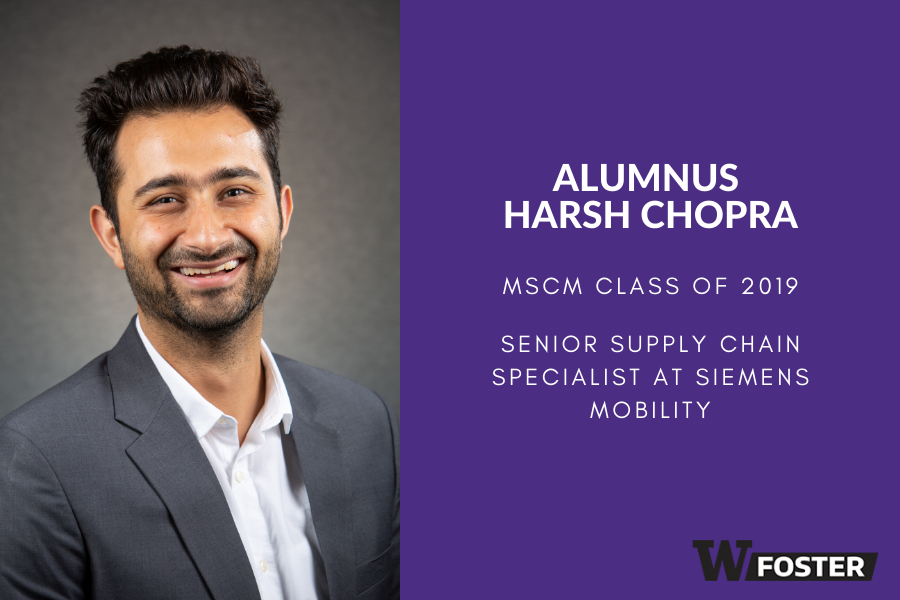MSCM ‘19 Alumnus Harsh Chopra on the Critical Skill Graduates Need & the Benefits of the MSCM Program for International Students

When Harsh Chopra entered the Master of Supply Chain Management (MSCM) program at the University of Washington in 2018, he had already worked in supply chain for four years in India, first as a Supply Chain Engineer at Ravi International and then as a Supply Chain Coordinator at SpiceJet Limited. “I did that work for years, before I realized there were many things I should know about what goes into the supply chain. I was lacking knowledge and skills of the correct supply chain strategies to follow,” he recalls.
Deciding on a Program Fit
The urge to deepen his knowledge of the industry and gain more skills led him to seek a master’s program. He immediately knew the type of program he wanted to pursue. “When I started to look at all the colleges in the supply chain field providing this specialty, I knew I didn’t want to take the MBA program route because it was too long. I wanted a fast-paced program so MSCM was perfect for me. I applied to other programs, but only as backup,” Harsh shared. “If you look at the program on the whole, I feel like it gives students a lot of time. You can have extracurriculars, time to talk to professors, and room to do other things you need to do, and still have time for the program.” Harsh was also enticed by the benefits of the program as an international student. “There are a few things that influenced me as an international student, first and foremost, it gets really expensive living here (in Seattle). Being able to work morning hours and study, and then go to classes in the evening, was key,” he said. The STEM classification also weighed on his decision to attend MSCM. Having a STEM degree meant he had up to three years of post-graduation employment eligibility in the U.S. “Then you have the University of Washington. It’s the best part. You stand out when you say you come here!”
Harsh had the experience he hoped for at MSCM. The program equipped him to fill the gaps of knowledge he previously had. “The program helped me understand supply chain on the whole. Things like forecasting or project management, these things were not in my background,” he explains. “I was working in sourcing before the program. I started as a planner. That was my foundation. I realized supply chain isn’t just limited to sourcing. There are so many other categories within the supply chain field. I learned all of that here.” Harsh also credits the balance of the curriculum as a success point of his growth. “Other colleges have more emphasis on data management or the supply chain, but MSCM is completely balanced in curriculum. It provides you the data side, the supply chain specifics, and the business side.”
Discovering Critical Skills in Supply Chain
After receiving his masters, Harsh landed a role as a Senior Supply Chain Specialist at SIEMENS Mobility in Sacramento, California. The company manufactures trains and locomotives, with major client contracts with companies like Seattle’s own Sound Transit. Harsh’s role is mainly operations management, with the responsibility to manage a team, own planning, and set the strategy for assignments to ensure timely production on the floor. “The most critical skill in my current job is running Excel,” he shares. “My company usually provides Excel courses for new employees, but I was at an advantage having already done the course in the program. It helped me stand out a lot during the interview process.” Harsh regularly reviews his MSCM course notes to build on his skills. He also notes just how crucial Excel would be for a new hire in his type of role. “It’s a big one, yes. Excel is critical because everything you do in my role is mostly done on Excel. It’s where I spend most of my time. Out of eight to ten hours at my job, six to eight of them are spent on Excel. You have to do analysis, figure out problems,etc., and it all requires Excel. It’s a foundational skill.”
When asked about other skills that make a candidate hireable in a role like his, Harsh is quick to share the biggest takeaway from his own career trajectory. “You need to have the curiosity to learn,” he says. “When I joined my company, I didn’t have the full skill set the job required, but I was keen to learn. I showed that in my interview by asking questions.” He emphasized the importance of always being a student. “You can teach many skills, but you cannot make someone eager to learn. So be curious, and want to learn. There will always be a skill you are lacking in a job, but when you show interest in the job, they know you are here to be a part of this company.”
Want to hear more stories from MSCM alumni? Check out MSCM ‘19 Alumna, Iris Yao’s, take on the impact the culture at UW had on her student experience.
Written by Olga Jimenez
MSCM Content Strategy Writer
[email protected]
